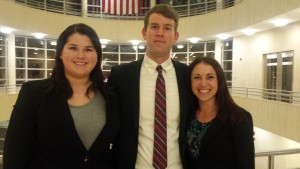Silicon Valley’s Challenge to Intellectual Property Law
Ted Ullyot titled his Helen Wilson Nies Lecture at Marquette Law School on Tuesday, “Innovation, Disruption, and Intellectual Property: A View from Silicon Valley.” He made it clear which two of those three elements are looked on favorably within that bastion of high-tech culture: innovation and disruption. That leaves one not looked on so favorably: intellectual property law, if you define that as protecting creative work through patents, copyrights, or trademarks.
Ullyot has gained great insight into what goes on between technological visionaries on one side and corporate lawyers on the other. From 2008 to 2013, he was general counsel of Facebook. That covered a period in which Facebook grew at an amazing pace, its stock went public, and it was sued by Yahoo! for patent infringement. Ullyot described the Yahoo! case in detail in his lecture, including the way that many of the leading figures in Silicon Valley who had no connection to Facebook were rubbed wrong by the Yahoo! suit because the culture of innovation was so oriented against asserting intellectual property rights.

